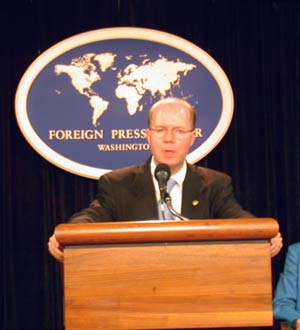White House P.O.V.
Air Date: Week of September 6, 2002
Host Steve Curwood talks with James Connaughton of the White House Council on Environmental Quality. As one of the U.S. government’s representatives in Johannesburg, he discusses the Bush administration’s goals and accomplishments at the summit.
Transcript
CURWOOD: I’m Steve Curwood at the World Summit on Sustainable Development in Johannesburg, South Africa.
One of the top coordinators of U.S. policy in the negotiations here has been the Chair of the White House Council on Environmental Quality, James Connaughton, and he joins me now. Hello, sir.

James Connaughton at an 8/21 press briefing on the World Summit for Sustainable Development. (Photo courtesy of U.S. Department of State.)
CONNAUGHTON: Hello. Good to see you, Steve.
CURWOOD: Tell me, how has this gathering been different from the Earth Summit in Rio?
CONNAUGHTON: The Earth Summit in Rio was largely an effort to set the agenda for sustainable development and put sustainable development on the map. As we move forward, we’ve been working and focusing on implementation. And that’s really been the question all along: How much implementation of that agenda are we seeing? What distinguishes the World Summit then is it is focused on poverty eradication as a theme. And we are looking at poverty eradication in specific subject areas: water, energy, health, agriculture, and even biodiversities, creating good environments for communities to grow.
CURWOOD: Tell me, what were the U.S. objectives here in Johannesburg?
CONNAUGHTON: It was our view all along that this summit should be dedicated to not just having governments internationally getting together, but bringing civil society in the private sector forward, along with environmental groups, consumer groups, citizen representation, to, again, talk about concrete actions related to the agenda that we’ve set for ourselves.
CURWOOD: Why didn’t President Bush come? His dad went to Rio ten years ago.
CONNAUGHTON: The president worked hard with the other world leaders earlier this year and they came together this year in Monterrey, Mexico. And there they announced the new Compact for Development. Having announced that compact with the world leaders, the president then personally carried that message to the G8. When it comes then further to the president’s further personal commitment, he has already announced he will be coming to Africa early next year. And I think there, at that point, he will put his own personal mark on our commitment to development in this part of the world.
We look to this summit, as we did to the Food Summit earlier this year, as a key implementation summit. We have representatives from almost every department of the U.S. government, the President’s top leaders, responsible for implementing the actions that we need to see.
CURWOOD: And what were the most important concrete actions here?
CONNAUGHTON: We announced a major initiative with respect to providing water for the poor. It was a $970 million dollar initiative that will leverage non-governmental resources up to $1.6 billion dollars to deal with what everybody recognizes as the fundamental issue with respect to poverty, and that’s lack of access to clean, safe water.
CURWOOD: Here in Johannesburg, the U.S. opposed any specific goals for renewable energy. Why was the U.S. so concerned about not having specific goals?
CONNAUGHTON: First of all, our commitment from the outside couldn’t be stronger to the advancement and promotion of renewable energy technologies. And our spending both at the national level and the international level in promoting those is unsurpassed in the world. Our objection to putting in a specific date and a specific target is the fact that we have not sat down, either at the international level or even at the regional level, to identify the plan by which that would be achieved. We are trying to reset the international conversation to sitting down and creating the plan, coming up with the target, and then holding ourselves to it. You create that kind of energy, we can get the market forces to bring those prices those prices down. The prices come down, you’re going to get a lot more renewable energy, and that will accomplish much more than any stated target in the document.
CURWOOD: James Connaughton is Head of the White House Council on Environmental Quality. Jim, thanks for taking this time with us today.
CONNAUGHTON: Thank you.
Living on Earth wants to hear from you!
Living on Earth
62 Calef Highway, Suite 212
Lee, NH 03861
Telephone: 617-287-4121
E-mail: comments@loe.org
Newsletter [Click here]
Donate to Living on Earth!
Living on Earth is an independent media program and relies entirely on contributions from listeners and institutions supporting public service. Please donate now to preserve an independent environmental voice.
NewsletterLiving on Earth offers a weekly delivery of the show's rundown to your mailbox. Sign up for our newsletter today!
 Sailors For The Sea: Be the change you want to sea.
Sailors For The Sea: Be the change you want to sea.
 The Grantham Foundation for the Protection of the Environment: Committed to protecting and improving the health of the global environment.
The Grantham Foundation for the Protection of the Environment: Committed to protecting and improving the health of the global environment.
 Contribute to Living on Earth and receive, as our gift to you, an archival print of one of Mark Seth Lender's extraordinary wildlife photographs. Follow the link to see Mark's current collection of photographs.
Contribute to Living on Earth and receive, as our gift to you, an archival print of one of Mark Seth Lender's extraordinary wildlife photographs. Follow the link to see Mark's current collection of photographs.
 Buy a signed copy of Mark Seth Lender's book Smeagull the Seagull & support Living on Earth
Buy a signed copy of Mark Seth Lender's book Smeagull the Seagull & support Living on Earth

